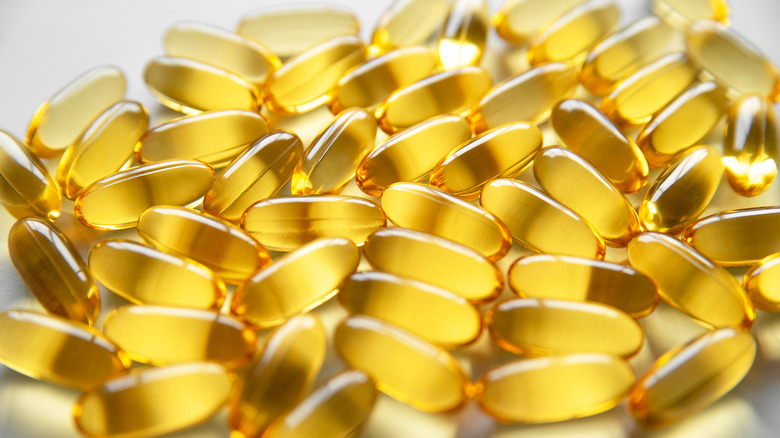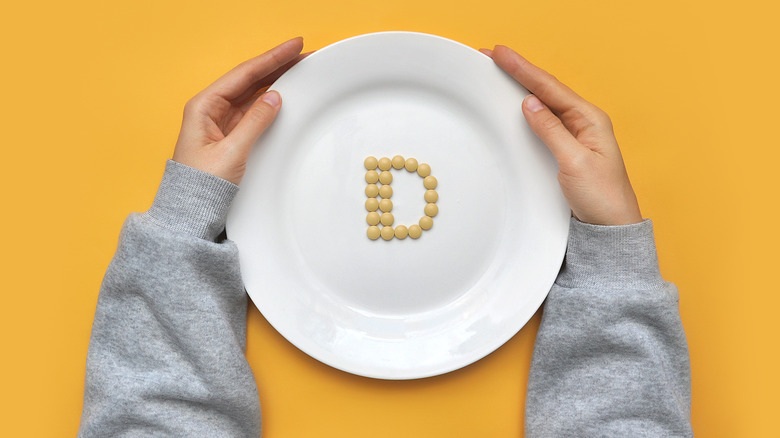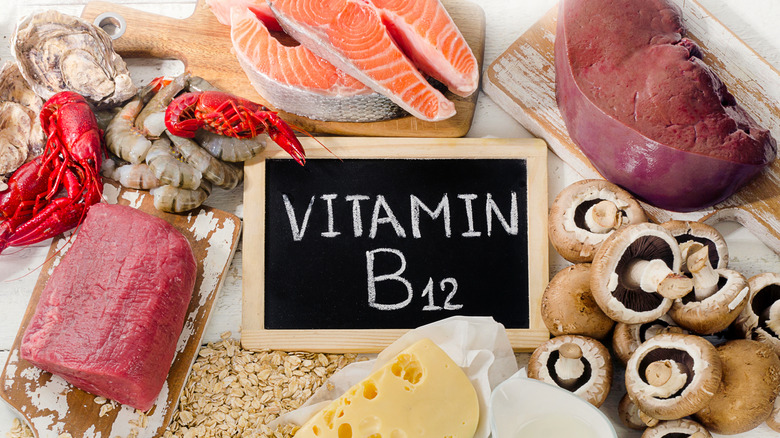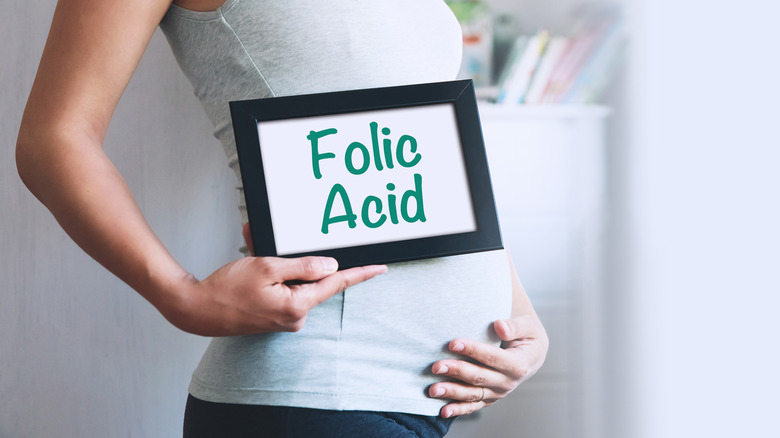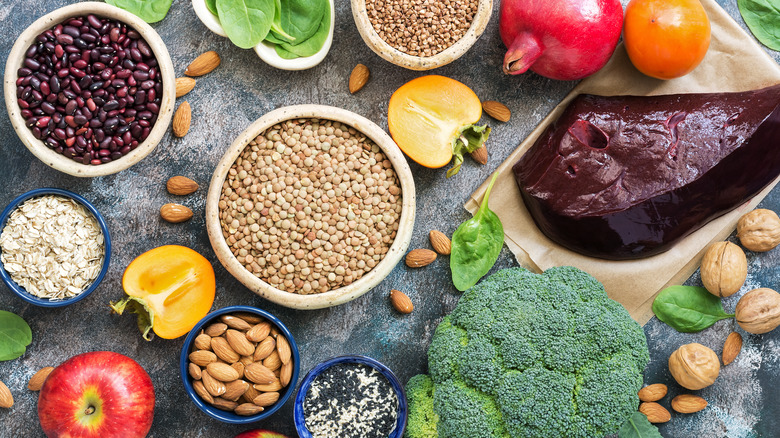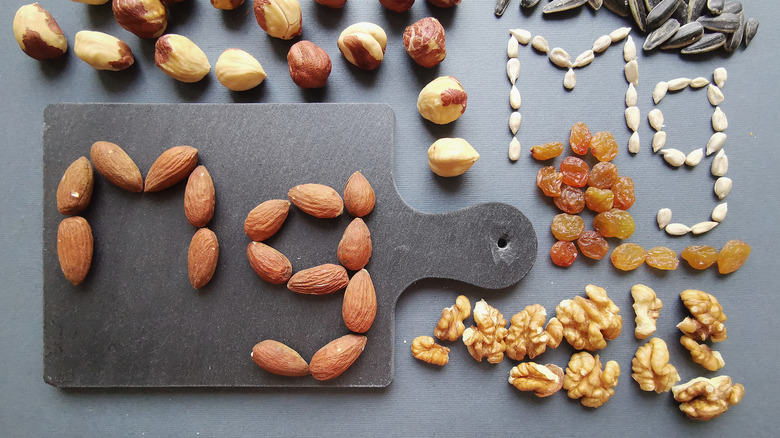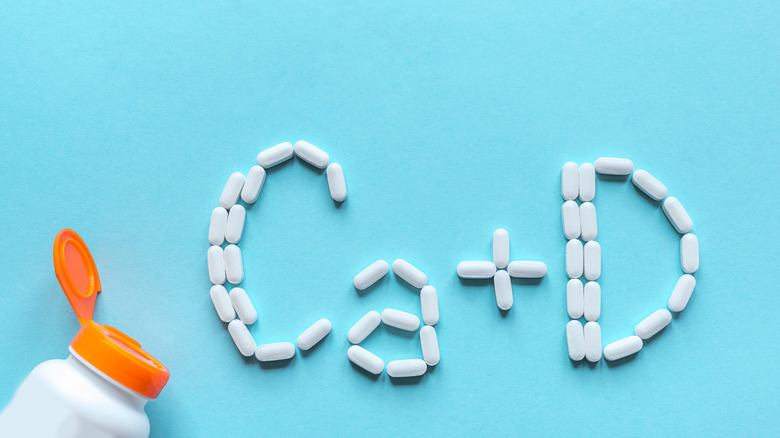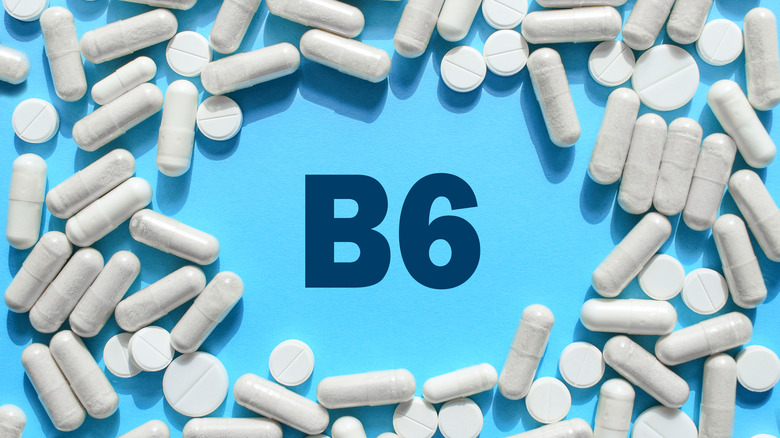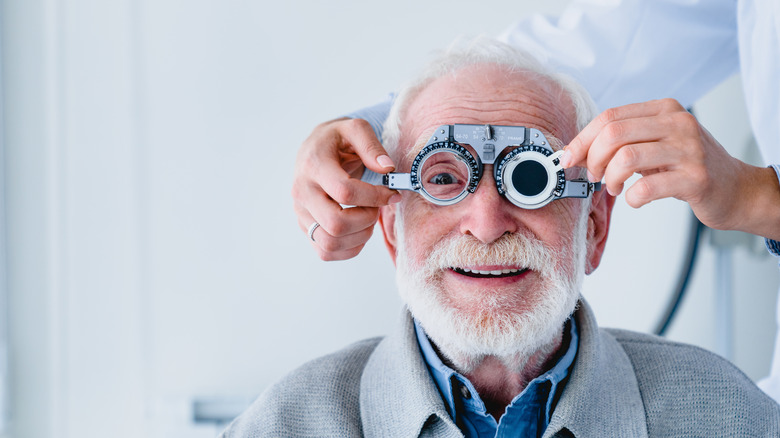Vitamins You Should Be Taking At Every Age
It's probably no great surprise, but vitamins? They're pretty good for you! These substances are essential to keep our bodies ticking along in good order, and as anyone who's ever walked into a health store will tell you, the vitamin industry is showing no signs of slowing down. In fact, the dietary supplement market in the U.S. is predicted to almost double in size within eight years, going from $31.7 billion in 2016 to an eye-watering $56.7 billion by 2024 (per Statista).
And as we age, certain vitamins become more important, dependent on what our body's going through at different stages of our lives. While it's important to remember that nothing can beat a healthy diet in terms of getting the vitamins we need (as British dietitian Michelle McGuinness says to Coach Magazine, "taking a multivitamin would not rectify a bad day's diet"), it's also useful to remember that it pays to be aware of what kinds of vitamins we should be prioritizing within a healthy, balanced diet, and that in certain cases a vitamin supplement could be a great choice for your health. So from your teens to your 80's, let's take a look at the vitamins you need at every age.
In your younger years, calcium is massively important
That carton of milk you used to get at elementary school has its benefits, and these don't stop once you get to junior high. The calcium that you get from milk and dairy products, as well as types of seeds, leafy greens, and nuts (per Healthline), becomes particularly important during your teenage years, according to St. Louis Children's Hospital and Washington University School of Medicine's pediatric hospitalist Shobha Bhaskar, via Children's MD. This is all down to calcium's crucial role in strengthening bone mass.
As Bhaskar states, when we're growing through our teenage years, our bones are changing and developing bone mass, which we then gradually lose throughout the rest of our lives. With 75% of our bone mass being developed by the age of 17, making sure we get enough calcium during this time gives us (and our skeletons) the strongest start possible for proper bone health in our adulthood. Bhaskar says that all young people between the ages of 9 and 18 should be aiming to get 1300 mg of calcium per day. For reference, 300 mg of calcium is around the amount you'll get in an 8-oz. serving of milk. It's worth pointing out that according to a review published in Critical Reviews in Food Science and Nutrition, most children and adolescents don't get the necessary amount of calcium per day worldwide –- and this deficiency is growing in the Western world.
Vitamin D is vital in your teen years
Anyone who's ever tried to convince a teenager to go outside and get some sunlight and fresh air will know how much of a challenge it can be. But if you're on the verge of giving up, knowing how important it is for adolescents to get adequate amounts of vitamin D might persuade you to give it one more go. During your teen years, it's vital to maintain healthy levels of vitamin D, which can be received from sunlight, as well as from dietary sources like fatty fish, egg yolks, and fortified cereal and dairy products, per WebMD. In your adolescence, receiving an inadequate amount of vitamin D may limit your ability to gain bone mass during a crucial development period, and may also impair muscle function, the development and maintenance of the cardiovascular system, insulin sensitivity, and a healthy immune system, according to an article published in Adolescent Health, Medicine and Therapeutics. Research published in the Journal of Adolescent Health states that in teenagers who are at risk of or who have a vitamin D deficiency, supplementation of "at least 1,000 IU daily" can be an effective way to bring levels back up. For all other teens, sunlight (in limited doses) is their best friend.
In your 20s, it's useful to keep track of your vitamin B12 levels
Your 20s are a time to figure out a lot of things (and some of us still are, trust us). And, while we're reluctant to add further stuff to consider while you're trying to sort out your entire life, working out a strong source of vitamin B12 is hugely important during this period. As Livestrong states, vitamin B12 is vital to sustain healthy energy levels and to help create red blood cells to adequately transport oxygen around our bodies, as well as to form new genetic material. This is particularly important for people who are thinking about starting families during this period in their life, as proper vitamin B12 levels are crucial for a baby's healthy development.
A lot of the time, there's no need to supplement B12 specifically. "B vitamins can easily be obtained from eating a healthy diet," states registered dietitian Janet Bond Brill to Everyday Health. However, as B12 is often obtained in the diet from foods of animal origin (per the National Institutes of Health), if you're following a vegetarian or vegan diet, it might be worth doing an audit of your diet to make sure you've got healthy sources of this vital vitamin.
Folic acid is important in your early adulthood, specifically for childbearing
During your earlier adulthood years, the big question of kids can come around faster than you think. And if you're pregnant or considering pregnancy soon, ensuring you have adequate amounts of folic acid in your diet is crucial. Folic acid, and folate, are particularly important for reproductive health "as it prevents birth defects to the brain and spine," states certified dietician and nutritionist Mariana Serback to Livestrong. Your body requires folate to be able to make DNA and genetic material, per the NIH, and adequate amounts in your diet are hugely important during pregnancy.
It's particularly essential to keep an eye on folic acid intake as this nutrient isn't fat-soluble. Therefore, as registered dietitian nutritionist Tama Bloch points out, "[it] needs to be constantly replenished to maintain healthy levels," as it can leave your system quite quickly after ingestion (per Abbott). Vegetables, types of nuts and peas, and fruits and fruit juices are all sources of folate, and folic acid is often added to food products like cereal and bread to fortify them.
When you're a young adult, iron is essential
It's easy to underestimate how important iron intake is during your early adulthood, but the fact remains that it's one of those nutrients that your body really needs during this period. As registered dietitian Jessica Ball states via EatingWell, iron is a fundamental building block of red blood cells, which serve to transport oxygen effectively around our bodies. The mineral also serves to build proteins in our bodies that support healthy cell function, neurological development and health, the formation and maintenance of healthy connective tissue, and more. An iron deficiency can lead to pretty bad fatigue and low energy levels.
During periods of menstruation, pregnancy, and breastfeeding, and menopause, making sure iron levels are maintained is extra important, as these are times of extra nutritional requirement and demand (per Better Health). Accounting for menstruation and iron lost during a cycle is worth keeping in mind, and make sure to watch out for symptoms of anemia, which can include breathlessness, tiredness, headache, dizziness, and brittle nails and/or hair.
Omega-3s are important when you're an adult
So we don't know if anyone's mentioned it before, but omega-3 fatty acids are pretty good for you. We know, right? Shocker. But despite the now-ubiquitous knowledge that omega-3s are highly important as part of a healthy diet, we just don't get enough of them. "Pretty much everybody's diet is deficient in omega-3s. I think that's why adding them back in seems to have so many health benefits," says David C. Leopold, director of integrative medical education at the Scripps Center for Integrative Medicine in San Diego, to WebMD.
And adding them to your diet in your young adulthood can help you preempt and minimize the risk of a host of long-term conditions. "A lot of diseases, like heart disease and arthritis, seem to be related to an inflammatory process," Leopold states. "Omega-3s can tune down the body's inflammation, and that may be how they help prevent some of these chronic diseases." In younger adults specifically, the regular consumption of omega-3s can help to reduce rates of heart disease, reduce the risk and incidences of depression, and may help reduc the risk of cancers, according to WebMD.
Magnesium deficiency is common in adulthood, so taking some is useful
Magnesium may not be the first nutrient we think of when we consider a healthy, balanced diet, but this mineral is super important to make sure you get enough of it in your adulthood. As nutritionist Kerry Torrens points out in BBC Good Food, magnesium — which is readily available in nuts and seeds — is vital for strengthening our bones and preventing the later risk of osteoporosis. The mineral also has important functions for mental health and can help to reduce symptoms of depression and anxiety and help boost mood, as well as helping to lower blood pressure and reduce symptoms of premenstrual syndrome. Magnesium also has useful benefits to aid healthy sleep, something which all younger adults can do with more of. (No? Just us? Okay then!).
Despite the important function of magnesium, for a host of health reasons, as a review published in Coronary Artery Disease points out, "the vast majority of people in modern societies are at risk for magnesium deficiency." Make sure you don't fall prey to the same deficiency and keep yourself topped up on this nutrient.
Along with calcium, vitamin K2 is important during adulthood
In the pantheon of the all-time marketable vitamins (we're looking at you, vitamin C!), vitamin K2 isn't exactly one that stands out for most people. But in fact, this lesser-known vitamin plays a vital role during our adulthood for its contribution to bone health. As registered dietitian Aglaée Jacob writes for Today's Dietitian, vitamin K2 works with calcium to help the mineral synthesize effectively, and when activated helps calcium in its journey into our bones and in forming healthy bone structure. Lower vitamin K2 levels have been associated with osteoporosis in later life, reinforcing its helpfulness to be taken alongside a calcium supplement.
Vitamin K2 is also important in helping prevent calcification in artery walls, thereby helping maintain heart health, as WebMD states. While it's possible to supplement vitamin K2 in diets, dietary sources include different types of cheeses, chicken, butter, natto, and eel (via Today's Dietitian). Sauerkraut, egg yolk, and beef liver are also great sources of the little-known vitamin.
When you reach your middle ages, certain vitamins become even more important
As we age, the demands of our body continue to shift, and our vitamin and mineral intake also needs to shift accordingly. Upon reaching our 40s, two nutrients take on even more importance: calcium and vitamin D, according to Livestrong. Calcium is needed to help maintain bone health, function, and structure (per Livestrong), meaning that doing what we can to keep them healthy is essential. Getting enough calcium, to build up stores in our bones, helps with this.
And calcium is nothing without vitamin D, which is vital to help the gut absorb the mineral and to help keep calcium levels high (as well as levels of phosphate, which is also important for bone health). While it's easy to assume we're getting enough vitamin D from sunlight, it's common to become deficient: As registered dietitian and manager of wellness nutrition programs at the Cleveland Clinic Wellness Institute Kristin Kirkpatrick states, "If you're living anywhere above Georgia, you're probably not getting enough vitamin D from the sun" (per Prevention). Kirkpatrick recommends taking a vitamin D3 supplement specifically, with a minimum of 600 IU per day at age 40, and 800 IU at ages 50 and over.
You might not need to take a potassium supplement, but as you age, keep an eye on your intake
Okay, so it may not technically be a vitamin, but trust us when we say that you'll need to keep an eye on this nutrient as you get older. Potassium is an often-overlooked mineral that plays a vital role in nerve and muscle function, with particular importance in helping your heartbeat be regular and healthy (per MedlinePlus). As registered dietitian Kristin Kirkpatrick states to Prevention, potassium also acts to help keep your blood pressure healthy, with research finding that higher levels of potassium in postmenopausal individuals were linked to a lower risk of stroke.
However, if you're starting to worry about your potassium levels, reaching for a potassium supplement is not the best idea, says Kirkpatrick. A varied diet including potassium-rich foods like bananas, beans, and sweet potatoes should help you get enough of the mineral, and there's little chance of getting too much of it. Taking a potassium supplement, however, can be very dangerous, unless you're advised specifically to do so by your doctor, as they can cause cardiac arrhythmias and harm to the gastrointestinal tract.
In your 50's, protect your bones with calcium and vitamin D
When we advance into our fifth decade, our bone behavior begins to change quite quickly. As registered dietitian nutritionist Stephanie Schiff, working at Northwell Health's Huntington Hospital in Huntington, New York, says to The Healthy, when you reach your 50's "instead of building bone you are preserving the bone you already have." Your bones begin to break down faster than they're able to rebuild new tissue, and looking after them becomes a higher priority due to an increased risk of osteoporosis and bone fracture or injury, states Johns Hopkins Medicine. So, to make sure that your skeleton's well-protected, keeping up your levels of calcium and vitamin D — which work together to help preserve your bones — is essential.
Try to get your daily requirement of 1,200 mg of calcium and 800 IU of vitamin D per day, and keep an eye on any lifestyle factors that might affect bone health such as smoking cigarettes, overusing alcohol, or inactivity. If you decide to take a calcium supplement, make sure you talk to your doctor first to "make sure there are no other issues or contraindications with other medications that may affect how you absorb calcium," says Schiff.
As you get older, keep your vitamin B6 levels topped up
B vitamins are important at every stage of life, contributing to everything from correct cellular function and construction to helping convert food into energy (per Medical News Today). In our older years, one specific B vitamin, B6, becomes even more vital due to its function in maintaining mental and brain health. As well as playing an important part in reducing the risk of cardiovascular disease, research has found that older adults with higher levels of vitamin B6 in their blood tend to have better memory and cognitive performance (via The Journals of Gerontology).
A further review published in the journal Nutrients has observed a link between B vitamin intake (including vitamin B6) and correct neurological function, as well as a link between deficient vitamin B6 levels and higher occurrences of dementia and cognitive decline. The review also points out that deficiency in B6 and other B vitamins can be frustratingly common. If you're unsure whether you're getting enough B6, consult with your doctor.
For older adults, vitamin D levels become important for more specific reasons
It's hard to overstate the importance of vitamin D at any age, but at an advanced age, you do need to keep an eye on it –- for your eyes themselves. As research published in the Journal of Optometry discusses, maintaining adequate vitamin D levels could be important to help prevent age-related macular degeneration, particularly common in individuals over the age of 60 (according to WebMD), and subsequent loss of eyesight.
And that's not the only reason why vitamin D is especially crucial for older adults. As the Journal of Optometry review notes, vitamin D plays an important part in maintaining a healthy immune system, helping older adults combat seasonal illnesses like the flu more readily. A further review published in Aging and Disease discusses the fact that having adequate vitamin D levels can also help maintain a healthy cardiovascular system and lower the risk of type 2 diabetes. If ready access to sunshine is hard to achieve, then taking a vitamin D supplement is a good idea.
In your 70s and 80s, vitamin B12 may be important to supplement
In older adults, vitamin B12 deficiency becomes more prevalent –- as a research review published in Current Opinion in Clinical Nutrition & Metabolic Care points out, this period of your life is one in which you're most likely to not be getting enough B12. As you get older, this vitamin becomes harder for your body to absorb, meaning that you may need to adjust your intake accordingly.
This is particularly important in your 70s and 80s as B12 is important to help support cognitive function (per WebMD), as well as the supporting of cellular health. Crucially, a B12 deficiency can produce symptoms that look a lot like age-related memory loss, Alzheimer's, cognitive decline, depression, or cardiovascular disease, states WebMD. Numbness or tingling in the limbs, yellowing skin, or anemia can also be symptoms of a deficiency. Having your blood tested regularly for a B12 deficiency from the time you turn 60 is a useful way to keep track of your levels throughout your older years, and you should try to consume 2.4 mg of the vitamin each day. Make sure you check with your doctor regarding your specific needs, however, as everyone is different.

